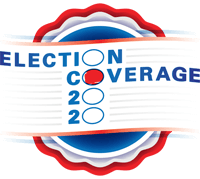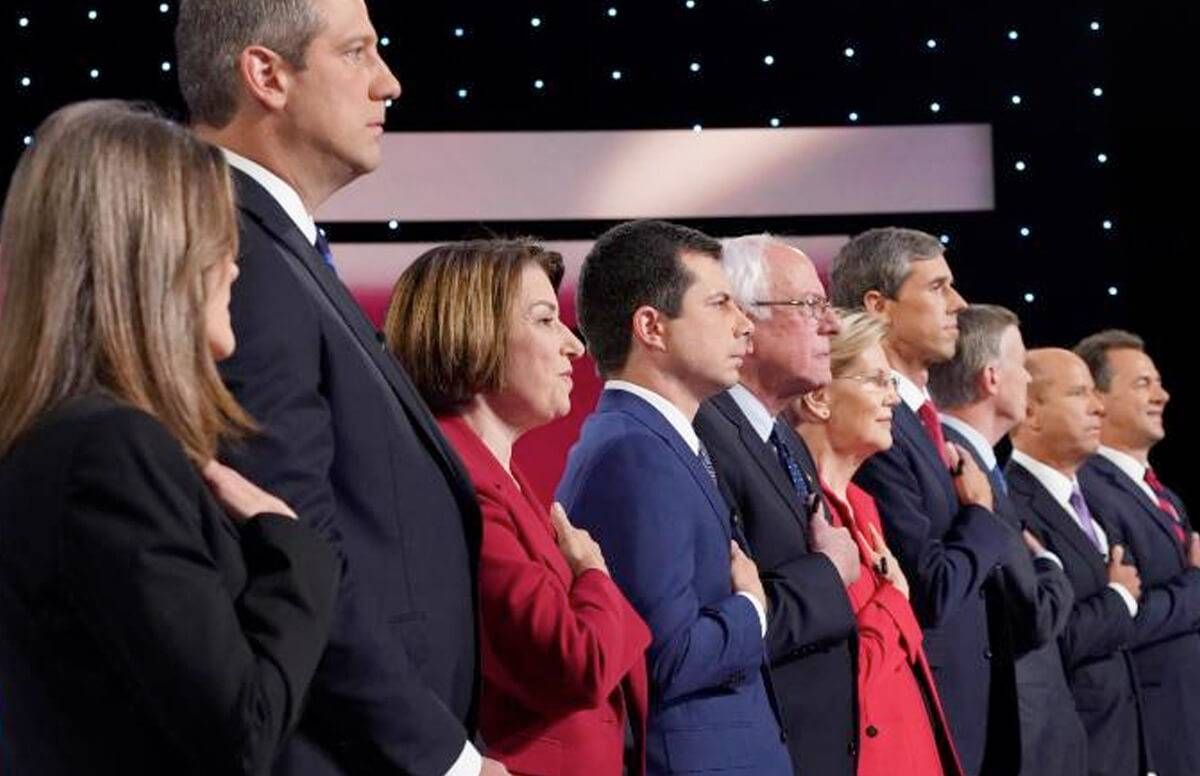2020 Election: Takeaways for Older Voters From the CNN Debates
The Democrats on health care, climate change, student debt, the economy and age

Much of the media attention over the Democratic presidential candidates’ two-night showdown in Motown focused on who had the knockout jabs and lines. I was watching to hear what the 20 White House hopefuls said they’d do to try to make lives better for Next Avenue’s readers in their 50s and 60s, their parents and their kids and grandkids.

Put aside the hyperbole — former Vice President Joe Biden saying he was running “to restore the soul of this country” — and there were quite a few notable points made on the Detroit stage laying out policy prescriptions for important issues affecting Americans’ lives.
Those included what the candidates said on two of the three top issues for Next Avenue readers, according to a recent survey we took: health care and climate change. The third top issue for readers — Social Security — sadly barely got a mention, although the Democratic contenders did address it during the recent AARP Forums I blogged about.
"Do I think we're going to vote to give free college to the wealthiest kids? No, I don't think we're going to do that," Klobuchar said.
Highlights from the candidates' proposals discussed during the debates:
Health Care
Most of the health care discussions focused on two topics: 1) the liberal Medicare for All proposals of Sen. Bernie Sanders and Sen. Elizabeth Warren vs. the moderate public option and Affordable Care Act mending health care ideas of the others and 2) bringing down prescription drug costs.
The Medicare for All moniker often seemed to be molded like Silly Putty to various candidates' definition. But it's quite different from Medicare, as Howard Gleckman said in his new Forbes article, “Medicare for All Has Nothing to Do With Medicare. Call It Something Else.”
The Sanders/Warren Medicare for All nonprofit health care system, Gleckman noted, “is far more generous — and more expensive” than Medicare as we know it (unlike traditional Medicare, it would cover hearing aids, eyeglass and dental care and have no deductibles or co-pays). And, Gleckman wrote, “its relationship with private insurance would be nothing like today’s Medicare.” That’s because if the plan fully took effect (Sanders says it would take four years, compared with Sen. Kamala Harris’ 10-year phase-in plan for “KamalaCare”), there’d be no more private insurance.
But, Warren said, “We are not about trying to take away health care from anyone.” (That, she claimed, is “what the Republicans are trying to do.”)
Our Commitment to You This Election
This report is part of an ongoing series on the 2020 presidential election and other significant U.S. elections. Our goal at Next Avenue is to provide accurate, relevant and impartial reporting on the issues that matter most to older Americans. In the run-up to election day, we will report on the candidates, parties and issues so you can determine who best stands for your needs. We also want to hear from you on what issues are most important and why, to help guide our election coverage.
Things got murky, however, when the Medicare for All supporters were asked whether Americans would end up paying more than they do now.
Warren deflected moderator Jake Tapper’s question about whether she was “with Bernie” on Medicare For All when it came to raising taxes on middle-class Americans to pay for it. Her response was that Americans would pay “less out-of-pocket for their health care,” adding that “for middle-class families, costs — total costs — will go down."
That’s not a sure thing, though.
Who knows how Congress would alter a Sanders/Warren bill, if the legislators passed it at all. What’s more, the proposal is vague on details. That’s why the independent Congressional Budget Office couldn’t ascribe a cost estimate to it.
Also, as the Kaiser Family Foundation’s Larry Levitt just told NPR, it’s unclear exactly how taxes would be raised to pay for it — who’d owe them and which taxes would be hiked — and whether taxes would cover the plan’s tab (roughly $32 trillion over 10 years).
A recent Marist College poll of Democratic voters found they prefer a Medicare for All-light plan (like South Bend, Ind. Mayor Pete Buttigieg’s Medicare for All Who Want It) over the Sanders/Warren version eliminating private insurance.
Biden explained how he’d rather amend the Affordable Care Act that took effect when he served with President Obama. He’d do it by: adding a public option, as Obama initially wanted; limiting health insurance co-payments to $1,000 a year, and noted “Americans would never have to pay more than eight and a half percent of their income" for health insurance.
The Democrats didn’t talk about long-term care, however, or Alzheimer’s — a major omission. As Nihal Satyadev, CEO and co-founder of The Youth Movement Against Alzheimer’s tweeted last night: Talking about the healthcare system without mentioning #Alzheimers is like talking about climate change without mentioning fossil fuels. #demdebate
The candidates on the debate stages were largely in agreement about bringing down prescription drug costs.
They favored letting the federal government negotiate drug prices for Medicare beneficiaries. Many also called for allowing the importation of medications from Canada (as President Trump just ordered), where prices are often lower. Sanders repeatedly mentioned his recent trip to Canada designed to make the point that insulin for people with diabetes costs ten times more here than there.
Climate Change
The Democratic candidates seemed to fight each other over who was more emphatic about addressing climate change. But, as Buttigieg said, “We have all put out highly similar visions on climate.”
Warren called climate change “the existential crisis for our world,” favoring spending $2 trillion on research and creating 1.2 million new jobs in green manufacturing. Beto O’Rourke said the climate change scientists he’s heard say “we don’t have more than ten years to get this right.” Buttigieg said “science tells us we have twelve years before we reach the horizon of catastrophe.” Montana Gov. Steve Bullock said he thought we could get to a carbon neutral world by 2040.

As an AP Fact Check story noted, however, “scientists don’t agree on an approximate time frame, let alone an exact number of years, for how much time we have left to stave off the deadliest extremes of climate change.”
Washington State Gov. Jay Inslee said climate change would be “the organizing principle of my presidency, not the first day, but every day." Inslee noted that he had a “big, bold ambitious plan for clean energy" and scoffed at Biden’s climate change ideas, saying “middle-ground solutions” like Biden’s “are not going to save us.”
Biden’s retort: “There’s no middle ground about my plan,” noting that he helped negotiate the Paris Climate Accord that Trump left and he’d “immediately rejoin" it.
Sen. Cory Booker agreed with Inslee “wholeheartedly,” adding that climate change should be “the lens with which we view every issue.” Rejoining the Paris Climate Accord, Booker suggested, was a given. “Nobody should get applause for rejoining the Paris Climate Accord,” he said.
Harris called for adopting The Green New Deal — co-sponsored by Sen. Kirsten Gillibrand and Warren, among others — to make the nation carbon-neutral by 2030.
John Delaney said that when he was in Congress, he introduced “the only significant bipartisan climate bill,” to get to “net zero” fossil fuel pollution by 2050. He also called for creating a “Climate Corps" national service program.
Student Debt
The candidates also agreed that reducing student loan debt and the cost of college was urgent, though some went farther on how they'd do it than others.
Sanders said he wanted all public colleges to be tuition-free and all student debt canceled.
Marianne Williamson agreed with Sanders on college debt. “If we get rid of this college debt, think of all the young people who will have the discretionary spending; they’ll be able to start their business,” she said. “The best thing you could do to stimulate the U.S. economy is to get rid of this debt.”
Williamson also wanted college free for all qualified students, saying “I think that all domestic and international policy should be based on the idea that anything we do to help people thrive is a stimulation to our economy.”
Sen. Amy Klobuchar wouldn’t go that far. “Do I think we’re going to vote to give free college to the wealthiest kids? No, I don’t think we’re going to do that,” she said. Klobuchar preferred to let people refinance student loans at better rates and improve student loan repayment programs for teachers and for people who go into “occupations where we don’t have enough workers.”
O’Rourke supported free two-year college and debt-free four-year college. “That’s not just for tuition. That is for room and books and board,” he noted.
Buttigieg, who along with his husband are paying down six figures of student loan debt, favored debt-free college “for low- and middle-income students;” expanding Pell Grants and making student loans more affordable.
(Read the new story "Is #CancelStudentDebt a Real Possibility?" by Next Avenue's sister site for younger readers, Rewire, and you'll see why experts are pessimistic about student debt elimination becoming a reality.)
The Economy
There were surprisingly few proposals on ways to grow the economy, address income inequality or help Americans get and keep jobs.
Sanders noted that “half of all the American people are living paycheck to paycheck,” but didn’t offer plans to address that.
Klobuchar talked about how “economic opportunity means economic opportunity for everyone in this country,” but only mentioned wanting “better child care and better education," paying teachers more, and making sure "there’s a decent retirement system in place.”
Sen. Michael Bennet and Julián Castro agreed that we “need to invest” in America but were short on details.
Entrepreneur Andrew Yang repeated his novel idea of The Freedom Dividend, which he called “a deeply American idea.” Yang would give every person $1,000 a month so they could use the money to stimulate the economy and start businesses. “It would be a game changer for millions of American families,” Yang said.
Harris noted her plan to help close the gender pay gap, so women would earn what men do for similar jobs. Under her plan, corporations would be required to post on their websites what they paid male and female employees and would be fined a percentage of their profits for large pay disparities.
As CNN’s Chris Cuomo might say, Warren and Delaney got after it on taxes.
Warren favored a wealth tax on the top one tenth of one percent of fortunes, roughly the richest 75,000 households (which moderator Don Lemon noted would include Delaney) to fund child care and education. Delaney said he thought “a wealth tax will be fought in court forever. It’s arguably unconstitutional.”
But Delaney said he believed “wealthy Americans have to pay more” in taxes. He recommended raising the capital gains rate on investments (now a maximum of 20%) to match the tax rate for ordinary income on employment earnings (now a maximum of 37%). The last president to do it, he noted, was Republican Ronald Reagan.
“There is no reason why people who invest for a living should pay less than people who work for a living. That’s ridiculous. It’s the biggest loophole in our tax code,” Delaney said.
Like Warren, New York City Mayor Bill De Blasio said he’d “tax the hell out of the wealthy.”
The Age of the Candidates
The topic of age and presidential candidates — just written about smartly by Mother Jones’ Nicole Javorsky — bubbled up once, between the youngest hopeful (Buttigieg, 37) and the oldest (Sanders, 77).
Said Buttigieg: “I don’t care how old you are. I care about your vision. But I do think it matters that we have a new generation of leaders stepping up around the world.” And, he added, “We can have great presidents at any age.”
Sanders, unsurprisingly, agreed. “Well, Pete is right. It’s a question of vision. That’s what it is, whether you’re young, whether you’re old, whether you’re in between,” Sanders said.


